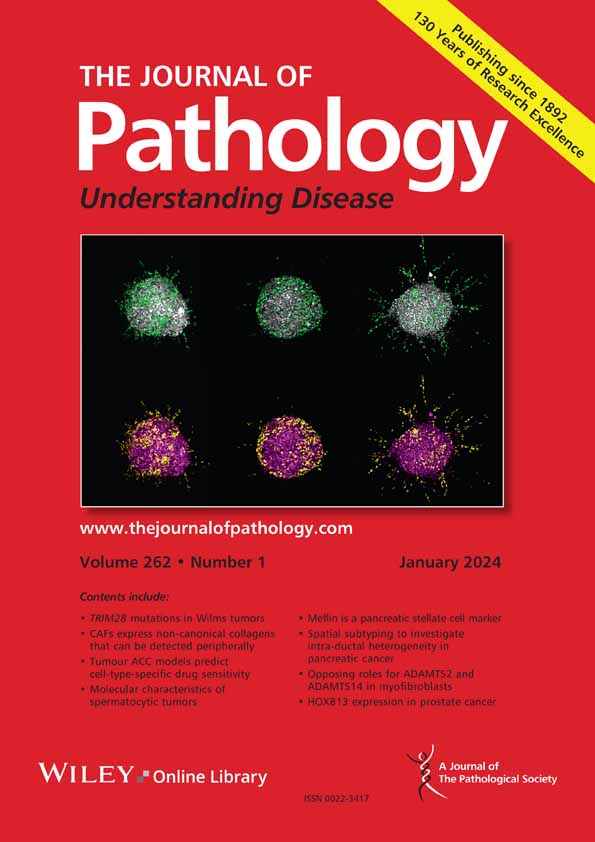Celia Barrio-Alonso, Alicia Nieto-Valle, Elena García-Martínez, Alba Gutiérrez-Seijo, Verónica Parra-Blanco, Iván Márquez-Rodas, José Antonio Avilés-Izquierdo, Paloma Sánchez-Mateos, Rafael Samaniego
求助PDF
{"title":"Chemokine profiling of melanoma–macrophage crosstalk identifies CCL8 and CCL15 as prognostic factors in cutaneous melanoma","authors":"Celia Barrio-Alonso, Alicia Nieto-Valle, Elena García-Martínez, Alba Gutiérrez-Seijo, Verónica Parra-Blanco, Iván Márquez-Rodas, José Antonio Avilés-Izquierdo, Paloma Sánchez-Mateos, Rafael Samaniego","doi":"10.1002/path.6252","DOIUrl":null,"url":null,"abstract":"<p>During cancer evolution, tumor cells attract and dynamically interact with monocytes/macrophages. To find biomarkers of disease progression in human melanoma, we used unbiased RNA sequencing and secretome analyses of tumor–macrophage co-cultures. Pathway analysis of genes differentially modulated in human macrophages exposed to melanoma cells revealed a general upregulation of inflammatory hallmark gene sets, particularly chemokines. A selective group of chemokines, including CCL8, CCL15, and CCL20, was actively secreted upon melanoma–macrophage co-culture. Because we previously described the role of CCL20 in melanoma, we focused our study on CCL8 and CCL15 and confirmed that <i>in vitro</i> both chemokines contributed to melanoma survival, proliferation, and 3D invasion through CCR1 signaling. <i>In vivo</i>, both chemokines enhanced primary tumor growth, spontaneous lung metastasis, and circulating tumor cell survival and lung colonization in mouse xenograft models. Finally, we explored the clinical significance of CCL8 and CCL15 expression in human skin melanoma, screening a collection of 67 primary melanoma samples, using multicolor fluorescence and quantitative image analysis of chemokine–chemokine receptor content at the single-cell level. Primary skin melanomas displayed high CCR1 expression, but there was no difference in its level of expression between metastatic and nonmetastatic cases. By contrast, comparative analysis of these two clinically divergent groups showed a highly significant difference in the cancer cell content of CCL8 (<i>p</i> = 0.025) and CCL15 (<i>p</i> < 0.0001). Kaplan–Meier curves showed that a high content of CCL8 or CCL15 in cancer cells correlated with shorter disease-free and overall survival (log-rank test, <i>p</i> < 0.001). Our results highlight the role of CCL8 and CCL15, which are highly induced by melanoma–macrophage interactions in biologically aggressive primary melanomas and could be clinically applicable biomarkers for patient profiling. © 2024 The Pathological Society of Great Britain and Ireland.</p>","PeriodicalId":232,"journal":{"name":"The Journal of Pathology","volume":"262 4","pages":"495-504"},"PeriodicalIF":5.6000,"publicationDate":"2024-01-30","publicationTypes":"Journal Article","fieldsOfStudy":null,"isOpenAccess":false,"openAccessPdf":"","citationCount":"0","resultStr":null,"platform":"Semanticscholar","paperid":null,"PeriodicalName":"The Journal of Pathology","FirstCategoryId":"3","ListUrlMain":"https://onlinelibrary.wiley.com/doi/10.1002/path.6252","RegionNum":2,"RegionCategory":"医学","ArticlePicture":[],"TitleCN":null,"AbstractTextCN":null,"PMCID":null,"EPubDate":"","PubModel":"","JCR":"Q1","JCRName":"ONCOLOGY","Score":null,"Total":0}
引用次数: 0
引用
批量引用
Abstract
During cancer evolution, tumor cells attract and dynamically interact with monocytes/macrophages. To find biomarkers of disease progression in human melanoma, we used unbiased RNA sequencing and secretome analyses of tumor–macrophage co-cultures. Pathway analysis of genes differentially modulated in human macrophages exposed to melanoma cells revealed a general upregulation of inflammatory hallmark gene sets, particularly chemokines. A selective group of chemokines, including CCL8, CCL15, and CCL20, was actively secreted upon melanoma–macrophage co-culture. Because we previously described the role of CCL20 in melanoma, we focused our study on CCL8 and CCL15 and confirmed that in vitro both chemokines contributed to melanoma survival, proliferation, and 3D invasion through CCR1 signaling. In vivo , both chemokines enhanced primary tumor growth, spontaneous lung metastasis, and circulating tumor cell survival and lung colonization in mouse xenograft models. Finally, we explored the clinical significance of CCL8 and CCL15 expression in human skin melanoma, screening a collection of 67 primary melanoma samples, using multicolor fluorescence and quantitative image analysis of chemokine–chemokine receptor content at the single-cell level. Primary skin melanomas displayed high CCR1 expression, but there was no difference in its level of expression between metastatic and nonmetastatic cases. By contrast, comparative analysis of these two clinically divergent groups showed a highly significant difference in the cancer cell content of CCL8 (p = 0.025) and CCL15 (p < 0.0001). Kaplan–Meier curves showed that a high content of CCL8 or CCL15 in cancer cells correlated with shorter disease-free and overall survival (log-rank test, p < 0.001). Our results highlight the role of CCL8 and CCL15, which are highly induced by melanoma–macrophage interactions in biologically aggressive primary melanomas and could be clinically applicable biomarkers for patient profiling. © 2024 The Pathological Society of Great Britain and Ireland.
黑色素瘤-巨噬细胞串联的趋化因子图谱确定CCL8和CCL15是皮肤黑色素瘤的预后因素。
在癌症演变过程中,肿瘤细胞会吸引单核细胞/巨噬细胞并与之动态互动。为了找到人类黑色素瘤疾病进展的生物标志物,我们对肿瘤-巨噬细胞共培养物进行了无偏见的 RNA 测序和分泌组分析。对暴露于黑色素瘤细胞的人类巨噬细胞中发生差异调控的基因进行的通路分析表明,炎症标志基因集,尤其是趋化因子普遍上调。在黑色素瘤-巨噬细胞共培养过程中,一组选择性趋化因子(包括 CCL8、CCL15 和 CCL20)分泌活跃。由于我们之前描述了 CCL20 在黑色素瘤中的作用,因此我们将研究重点放在了 CCL8 和 CCL15 上,并证实这两种趋化因子在体外通过 CCR1 信号转导促进了黑色素瘤的存活、增殖和三维侵袭。在体内,这两种趋化因子增强了小鼠异种移植模型中原发性肿瘤的生长、自发性肺转移以及循环肿瘤细胞的存活和肺定植。最后,我们利用多色荧光和单细胞水平的趋化因子-趋化因子受体含量定量图像分析,筛选了67个原发性黑色素瘤样本,探讨了CCL8和CCL15在人类皮肤黑色素瘤中表达的临床意义。原发性皮肤黑色素瘤的 CCR1 表达很高,但转移性和非转移性病例的 CCR1 表达水平没有差异。相比之下,对这两组临床表现不同的病例进行比较分析后发现,癌细胞中 CCL8(p = 0.025)和 CCL15(p = 0.025)的含量差异非常显著。
本文章由计算机程序翻译,如有差异,请以英文原文为准。

 求助内容:
求助内容: 应助结果提醒方式:
应助结果提醒方式:


